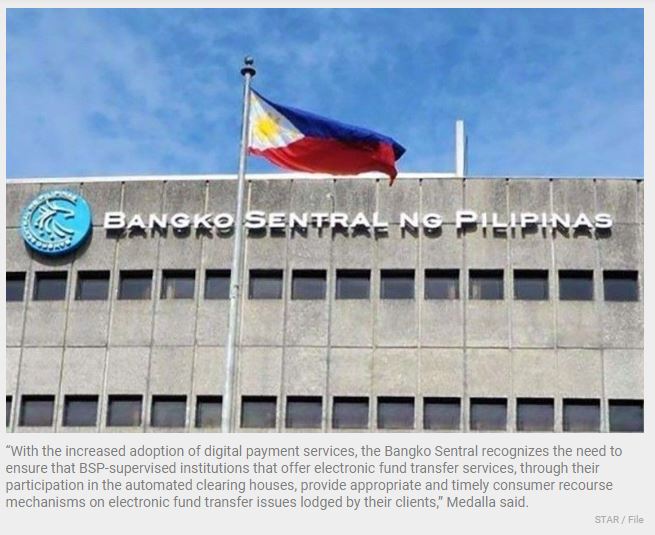Philippines: BSP to strengthen dispute handling settlement
MANILA, Philippines — The Bangko Sentral ng Pilipinas (BSP) is strengthening the guidelines on reconciliation and dispute handling for settlement and crediting issues in electronic fund transfers to further boost consumer protection.
The regulator aims to provide reconciliation and dispute handling mechanisms for issues encountered on settlement and crediting electronic fund transfers under the National Retail Payment System (NRPS) framework.
In a draft circular, BSP Governor Felipe Medalla said the use of electronic payment transactions continues to expand and is expected to steadily grow as part of the “new economy” environment.
“With the increased adoption of digital payment services, the Bangko Sentral recognizes the need to ensure that BSP-supervised institutions that offer electronic fund transfer services, through their participation in the automated clearing houses, provide appropriate and timely consumer recourse mechanisms on electronic fund transfer issues lodged by their clients,” Medalla said.
Medalla said defined industry-wide actions and expectations from automated clearing house participants on the timely resolution of customer concerns relating to electronic payments build trust and confidence in the use of digital payments.
Just recently, several users of e-wallet giant GCash complained about unauthorized electronic fund transfers.
Aside from unauthorized transactions, the proposed guidelines will also cover timed-out transactions or unsuccessful electronic fund transfers wherein no response was received within a given period, as well as unsuccessful transactions initiated by sender but not credited to the intended beneficiary account, and likewise as erroneous transactions involving transfers sent to an incorrect beneficiary account due to erroneous encoding by sender.
Under the proposed guidelines, clearing switch operators must immediately inform all concerned participants of the noted issues and corresponding rejected transactions.
The NRPS requires immediate credit to the account of the beneficiary after receipt of the clearing advice from the clearing switch operators.
The timeframe of immediate credit to the beneficiary’s account for near real-time transactions is within two to three seconds from receipt of clearing advice by the receiving financial institution.
For batched transactions, turnaround time for credit to the beneficiary’s account shall not exceed two hours from receipt of the clearing advice or not later than the next settlement cycle for multiple settlement cycles.
The originating financial institution should identify unsuccessful transactions and inform the sender within one hour from receipt of client instruction.
The BSP said the corresponding amount debited from the sender’s account in unsuccessful transactions shall be credited back to said sender’s account within one hour from receipt of client instruction for instant retail payments, multiple-charged transactions as well as for batch clearing and settlement of electronic payments.
For unauthorized and erroneous transactions, Medalla said all participants should put in place clear policies and procedures for providing assistance and redress to consumers that would form part of their Consumer Protection Risk Management System and Consumer Assistance Mechanism.
The regulator said the processing of complaints pertaining to unauthorized and/or erroneous transactions should be handled in accordance with existing BSP regulations set forth under Circular 1160 on the Regulations on Financial Consumer Protection to Implement Republic Act 11765 or the Financial Products and Services Consumer Protection Act.
On the disruption of financial services and operation, the BSP said participants should adopt a mechanism to timely identify scenarios that may result in disruption of operations and which may affect the availability of electronic payments facilities, including but not limited to operational risk factors such as technology, manpower, alternate site, and service providers.
“Causes of such interruptions may include, but are not limited to fire, earthquakes, flood, typhoon, long-term power outage, technical malfunctions including system downtime, pandemic, cyber attacks and other threats,” the BSP said.
The disruptions should be reported to the BSP within one hour from the noted incident.
To further protect the interest of the public and ensure positive consumer experience for consumers transacting via digital channels, the BSP said participants should release relevant public statements about system maintenance or downtime in various available channels no later than 15 minutes after the manifestation of such incident.
The regulator is also requiring BSP-supervised institutions to make public statements through various channels, at least three days prior the scheduled activity, related information regarding the scheduled system maintenance as well as the restoration of the affected systems as soon as possible.
The BSP also directed banks to establish effective mechanisms to ensure that all frontline personnel, including those that handle customer issues lodged through various available channels, possess adequate, accurate and relevant information about PESONet and lnstaPay to address consumer concerns and fund transfer issues.
Under its Digital Payments Transformation Roadmap, the BSP aims to shift 50 percent of total retail transactions to electronic channels and increase the number of Filipino adults with bank accounts to 70 percent by 2023.
Source: https://www.philstar.com/business/2023/06/15/2273880/bsp-strengthen-dispute-handling-settlement


 English
English




